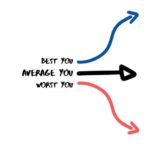Kyla Richey (TW @kylarichey INSTA: @kylarichey W: www.kylarichey.com) is a professional volleyball player who has been representing Canada for more than a decade. Over her career, she has received multiple awards including a CIS Player of the Year award and 2 CIS Championships MVP awards. Along with that, during her tenure as a UBC Thunderbird, she went 5/5 by winning the CIS National Championship every year she played. She has since played professionally around the globe everywhere from Italy to Azerbaijan.
One drawback to the written interview format is the fact that you, the reader, cannot fully experience the nuances of our conversation. In chatting with Kyla, I got a chance to learn more about what makes her tick and why she is the way she is. My hope was to uncover the mystery of what makes Kyla a great ‘Daily Athlete’ and I believe that what I have below will begin to unearth some of that hidden treasure. But something that is difficult to pick up on in plain text, is Kyla’s presence. In our conversation, we went from sharing childhood traumas, to the happiest moments of our lives, to the sadness of losing a loved one, to the power of ownership. Nothing was off the table and Kyla was fine with that. She is an open book, but not without caveat. Respect and empathy. If you want to see this side of her and get into these issues you cannot simple demand them, nor can you pretend like you know how she feels. There are nuances to Kyla, but once you figure those out, you will begin to realize that she is way more than just a successful athlete.
So without any further rambling, I give you, “What I Learned” in my interview with Kyla Richey.
GROWING UP IN A SMALL TOWN
You understand at a young age, it’s way more than just you perusing something. That’s definitely important, but it’s easier to give back to your community when it’s small because it means so much more to you and to them. You have the unique ability to show them that it’s possible to do, in a way, what they want you to do. You don’t just have to be a lifer in a small town. The kids can dream big; you want to show them that anything’s possible, so set your sights high. You’re so invested in all of them and they’re invested in you. Having an entire community backing and supporting your entire athletic career is something so special.
When I was in high school it was so rewarding to go back and coach the younger teams. In a small town, you’re introduced early on what it means to give back. So even now I’ll do that out here [Richmond] when I can. I love getting out into the community and meeting the aspiring athletes! It means a lot to me.
DEALING WITH PARENTS AS COACHES
Mom was always a little bit harder on me, but in a good way. Especially when I was younger and she would correct my technique, I wasn’t always the most receptive. My mom coached me from grade 4 until grade 12. She was my volleyball coach. But it was funny because I started to notice some other coaches tell me the exact same thing, and as I got older and I put my ego aside, I actually listened to her because she was always right.
Even on the junior national team in grade 10, I would hear other coaches and their feedback and think “I’ve heard this from my mother, she’s been saying this for years”.
Dad coached my brothers and I in a lot of sports. He ran us well; we were doing track and field training, fast feet, high knees, the ABC’s, literally when we were toddlers. We would go outside and he would put up cones in the backyard and make us do soccer drills and sprints. Always tricking my brothers and I into thinking it was fun (which it usually was because the three of us were insanely competitive). We would be on a nice family walk and he’d have a tennis ball flying back and forth to work on our hand-eye coordination. It was mean, but also kind of genius.
ADVICE FOR ATHLETES WITH TOUGH PARENTS
We owe them a lot. Tough love sets you up for a lot of things in life. My dad should have been a university professor and he was coaching us in grade 3 like we were twenty years old. But it’s all out of love. It’s good, because as you go through so many different coaches and different coaching styles (sometimes in different parts of the world!) you’ll realize that your parents were never that tough. They always have your best interest at heart.
HAVING A LONG CAREER: “I WOULDN’T STILL BE PLAYING IF I DIDN’T LOVE THE GAME”
In the early years of my National team career I was trying to learn as much as I could from the various coaches in the gym as well as my older teammates. Now, as this new quadrennial begins, I find myself as one of the most experienced players on the team. My role is to now stay consistent day in and day out, be a leader on and off the court, and set the standard and example I want the younger players to adopt. I am constantly trying to get better and I don’t think I will ever be satisfied with my play, therefore I am always striving to do more than the days, weeks, months, and years previous. There is always a new tournament to train for and (daily) goals to achieve. I wouldn’t still be playing if I didn’t love the game and just how much volleyball is truly a team sport.
Looking after your body is of course, so important. I have chronic injuries that I have to take care of and master that skill. Being diligent in taking care of your body, soul, and mind is a full-time job and the earlier an athlete can recognize and realize the necessary things to do, the smoother the road will be, and could very well extend your athletic career. There are always so many individuals that are willing to help and offer their opinions (sometimes good, sometimes bad) but at the end of the day you have to do what makes you perform at your best. Personally, I’ve learned over the years that I need to take time on my own to recharge, in order to have enough energy to support my team as well.
BIG LIFE CHOICES
Choice #1
I don’t really have any regrets in my life, which I am very thankful for. But one of the biggest decisions I made was staying in Canada and playing for UBC. I was going to go to University of Washington on a full ride scholarship, the year after they won the NCAA’s, and still don’t really know why I didn’t go. It was a hard decision for me and I went back and forth for a very long time. It would have been such a different life.
A big part of staying was that I really wanted to play for the Senior National team. I made the Junior National team in high school and so I wanted to continue playing for Team Canada. Going to play volleyball in the states makes things a little bit more challenging, as you often have to return for preseason training halfway through the National team season in the summer. My dream was to play for Canada for as long as possible, and UBC helped me fulfill this goal of mine.
Choice #2
In grade 11, my second year with the Junior team, we were training in Regina and I received a call from my mom that my two my best friends had passed away in a car accident. I went back for their celebration of life, but then ended up going back [to Regina] to finish the summer with the team. It would have been interesting had I not gone back. I learned that how you handle those types of situations really sets you up for persevering through things in (future) life as I tried to understand and navigate the balancing act that is “outside life” and volleyball. How do you channel that back into what you’re doing at the present time, while there are so many other things that seem more important – but then still choose volleyball? I think that’s the epitome of (a lot of) my career. Choosing. You have to choose it. You say, “This is what I want to do” and you just feel more settled. And you can run with that.
Even on the days where you don’t feel like going to the gym, in the grand scheme of things, I still want to play. So I’m choosing to put volleyball and all things that come hand in hand with being a National team athlete, as a priority in my life.
It’s not easy. But the weight gets lifted off you because you do actually want to be there. When given the choice to truly stay or walk away, I’ll stay. It’s always your choice.
ALWAYS GETTING BETTER
I always thought it was kind of negative to be so focused on only one thing [volleyball], but it had me so narrowed in and focused on my training and getting better, that I was doing things on the off days and in the gym that others weren’t doing. Doing extra reps whenever I could because all I was thinking was this [volleyball]. I had such a tunnel vision goal: making the Olympics.
If you individually want to excel on your team, you have to be doing more than your teammates.
I would do extra passing reps every day for an hour and be happy about it. I would find a coach who would be happy to help out and latch onto them. But still, I would have teammates who were saying things like “oh you’re going to do extra reps again?”
“I NEED TO BE AT 300% IF I WANT TO EVEN SURVIVE AND NOT LOOK LIKE AN IDIOT”
The end goal [making the Olympics] was in my brain and that’s what propelled me forward. But it wasn’t until the end of high school when I went to train with the Senior National team that I was introduced to real work ethic. I didn’t really know many of the girls because volleyball wasn’t broadcasted, but when I saw them training I was introduced to another level of hard work. A lot of my volleyball idols were made in that first week of training and those girls showed me what kind of player I wanted to strive to become. I remember thinking, “Holy crap! They are working their asses off, and I need to be at 300% if I want to even survive my athletic career. and not look like an idiot”.
DON’T IGNORE YOUR MENTAL HEALTH!
Mental health is so important and it’s a shame that there is still such a negative stigma around it. It’s been a relatively new thing in my life, battling anxiety and depression, which has naturally stemmed from the grief of losing my brother a few years ago. I am definitely in the beginning stages of learning how to deal with it, recognizing certain symptoms and triggers earlier, as well as develop coping mechanisms. I definitely wouldn’t categorize this a failure per say, but these symptoms have definitely spurred on more aggressively the last couple of years due to a “failure” to get help when I should have.
As an athlete, you learn how to cope with pressures and negative feelings and put on a brave face for coaches and teammates. However, I have learned that does next to nothing to help with the inner battles. I’ve gone from one performance goal to the next, ridiculously tough professional seasons where I’ve endured some of the most challenging and often ridiculous circumstances, and then moved right into National Team for 4-6 months. This leaves little time for putting mental health a priority when physically, I am so busy. It weighs on me constantly, and what’s worse, is I know how important it is to get the support I need. This next month’s goal of mine is definitely built around mental and holistic health. It’s my focus that’s going to the top of the To-Do list because I need to be taking care of my whole self. Even professional athletes are constantly still learning!
CHANGING MINDSETS OVER TIME
Naturally, volleyball was a huge focus and priority in my life and took president over most other things. It wasn’t until I suffered great loss in my life that I really realized how much more there is in life than just sport. Not to take away from it; many characteristics of my being have been crafted through sport and I love how sports can enrich your life. But I also finally realized that I was more than just a volleyball player and could offer a lot more to others than just performance as an athlete. I was dealing first-hand with the reality of how short life can be and how important it is to be truly happy with what you’re doing and how you’re spending your time. Once my grief sort of manifested, I really had to tap into smaller things that would bring me out of personal “dark” days and/or seasons and from there started learning more about other passions I had, besides volleyball.
USING GRATITUDE AS A TOOL, NOT JUST A STATE OF MIND
Gratitude can be such a huge key to unlocking happiness and perspective. When you’re in a funk I think it’s important to know that it isn’t the end of the world when sports (and performance) aren’t going how you initially planned. I’ve come to recognize that a bad mental state won’t last forever. If I am feeling extra low, it’s important that I take some time for myself to recharge and do some little or big things that make me happy – just as a reminder to enjoy life and find that joy in the every day!
ADVICE FOR HER 20-YEAR-OLD SELF
Being you is enough. You’re not perfect, but nobody is. Some of the hardest days of your entire life will fall upon you and your family, before you know it. Persevere. Be strong. But also know that it’s okay to be soft – that’s what makes you, you. On the really tough days, it’s okay to break down and feel the things you will. Let people in. It’s a messy journey and you won’t know where it will lead you most days. You’ll quickly learn that nothing is promised so enjoy the journey and enjoy the loved ones around you. Take absolutely nothing and no one for granted. People come and go from your life to teach you different lessons so during those moments, embrace them wholeheartedly. You’ve made your choice to continue on and keep playing, so do just that; keep choosing this life so you can get up, and show up, every day.
It’s always a choice. And it’s your choice.
KYLA’S KEYS TO UNDERSTANDING HER OWN SUCCESS (EXTRA THOUGHTS)
There are always sacrifices going forward.
Work ethic is the biggest thing. And you see it all the way from grade 3 to the national team.
If you’re smaller then you just be quicker and you play to your strengths
If someone is literally running the extra mile or doing the “courtesy dive” and hustling their butt off, and doing extra reps, and doing their extra exercises for personal injuries. [As a coach and teammate] you respond more to that person. And if someone’s not, and then they complain about playing time – they will get no respect there because…what did you expect?
FAVOURITE QUOTES:
“Because true belonging only happens when we present our authentic, imperfect selves to the world, our sense of belonging can never be greater than our level of self-acceptance.”
“But what we know now is that when we deny our emotions, it owns us. When we own our emotion, we can rebuild and find our way through the pain.”
“I don’t have to chase extraordinary moments to find happiness – it’s right in front of me if I’m paying attention and practicing gratitude”






Wonderful inspiring interview Kyla. Brought tears to my eyes. I feel blessed that my precious Alicia can learn from your example.